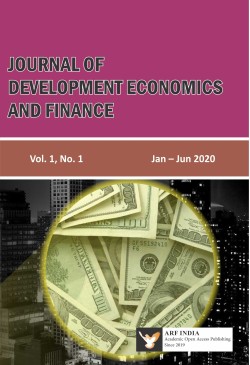
Journal of Development Economics and Finance
Frequency :Bi-Annual
ISSN :2582-5194
Peer Reviewed Journal
Welfare Effects and Importance of Skills and Human Capital Development Policies in a DCGE Model of Ghana
Compensation Tools and Employee Performance in Nigerian: A Selected Study of Ministry of Youth and Sports, Edo State
Entrepreneurship, Social Environment and Endogenous Growth
Testing the Weak Form of Efficient Market Hypothesis in Developing Countries (LDCs) Stock Markets: Limits and Suggestions
Impact of Petroleum Products Price Changes on Prices of Food Items in the Nigerian Economy
Impact of International Trade on Economic Growth: The Granger Causality Test Approach
Environmental Sensitivity and The Performance of Corporate Organisations in Developing Countries: Evidence from West Africa
Real Wages, Inflation and Unemployment Nexus, Implication on Welfare in Sub Saharan Africa
Sustainability Reporting and Firm Value of Listed Oil and Gas Companies in Nigeria
Inflation-Forecast Targeting: A New Framework for Monetary Policy?
Impact of Government Expenditure, Unemployment, Inflation and Households Consumption on Economic Growth in India
The impact of government expenditure, unemployment, inflation, and household consumption on the economic growth of India over the period 1990-2021 has been examined in this paper. The ordinary least squares (OLS) regression analysis was performed by observing the assumptions of the classical linear model. Augmented Dickey-Fuller (ADF) and Philips-Perron (PP) tests were carried out for stationarity of the concerned variables. The study found that increasing government expenditure has a strong positive influence on the growth of national income and consumption and a negative influence on unemployment in India. The study recommends increasing government expenditure that could accelerate economic growth and create employment opportunities that also have a positive impact on improving consumption. Results indicate that inflation significantly depresses economic performance in India because of uncertainty and reduces investment, employment, and consequently output and consumption level. Unemployment has not significantly impacted the real GDP in India. Investment in physical capital and human capital has significantly promoted economic performance in India because investment in human capital improves the productivity of the labor forces and hence increases output and investment in physical capital increases the amount of capital per unit of labor and these have the potency of increasing productivity per worker. The overall effect is the increase in output and therefore economic performance. The study recommends increasing government expenditure as it boosts aggregate demand which could accelerate economic growth and create employment opportunities and enhance the consumption level of the public.
Keywords: Unemployment, Government Expenditure, Inflation, Consumption, Output Growth;
Jitendra Kumar Sinha (2023). Impact of Government Expenditure, Unemployment, Inflation and Households Consumption on Economic Growth in India. Journal of Development Economics and Finance, Vol. 4, No. 1, pp. 247-261. https://DOI: 10.47509/JDEF.2023.v04i01.11
Influence of Monetary Policy on International Trade : Cointegration and Error Correction Mechanism